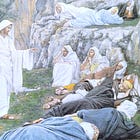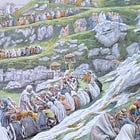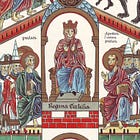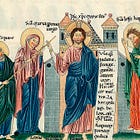Why did Christ wait until evening to feed the multitude?
Did Our Lord deliberately prolong his teaching for the sake of a miracle?
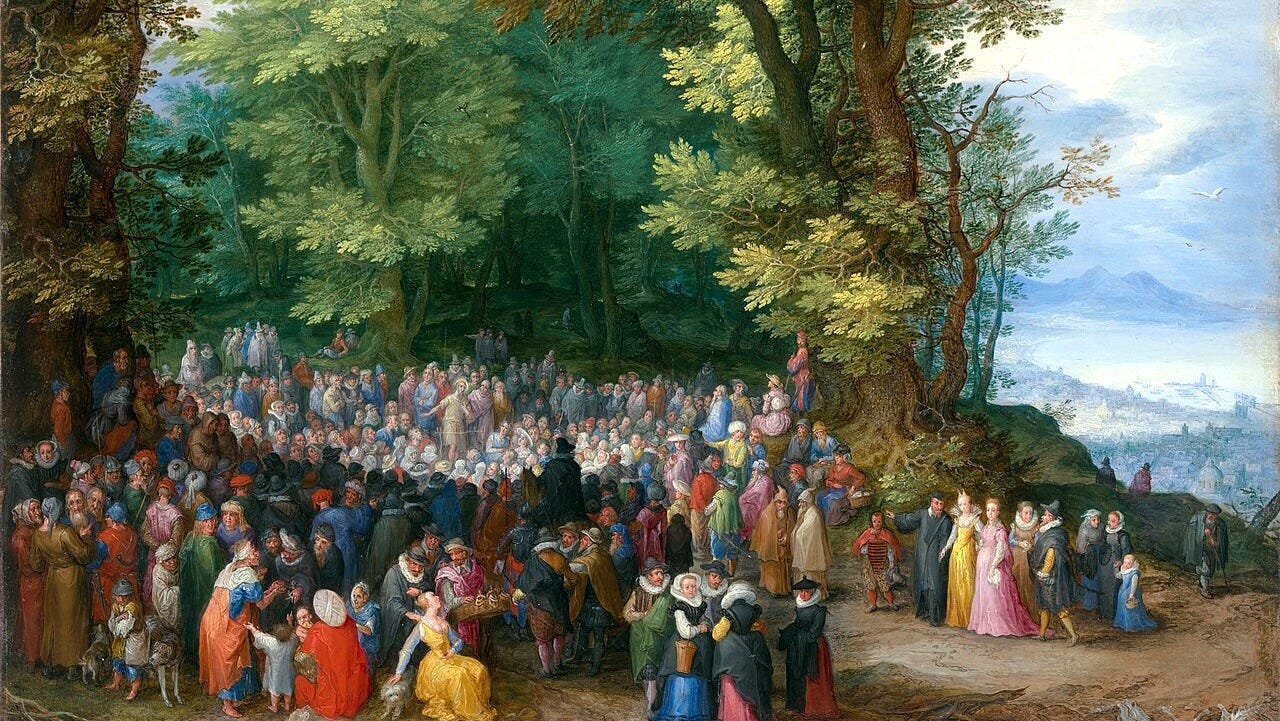
Did Our Lord deliberately prolong his teaching for the sake of a miracle?
Editor’s Notes
In this piece, Fr. Coleridge tells us…
How Christ foresaw both the bodily and spiritual hunger of the crowd from the beginning.
That his compassion began with teaching and healing, before revealing the bread that satisfies.
Why the Apostles' natural concern gave way to a divine response far beyond human reckoning.
He shows us that in every act of mercy, Christ is already preparing a higher gift than we expect.
For more context on this episode, its significance and its place in the Roman Liturgy, see here:
Feeding the Five Thousand
The Training of the Apostles, Part IV, Chapter VII
St. Matt. xiv. 13-21; St. Mark vi. 30-34; St. Luke ix. 10-17; St. John vi. 1-13.
Story of the Gospels, § 72
Burns and Oates, London, 1885
Headings and some line breaks added.
Sung on the Fourth Sunday of Lent
Part I: Why did Christ and his Apostles withdraw before feeding the five thousand?
Part II: Why did Christ wait until evening to feed the multitude?
Part III: What does the multiplication of loaves teach about the Church and the Apostles?
Part IV: Was Christ thinking of the Holy Eucharist when he multiplied the loaves?
Order of the incidents of the feeding of the five thousand
The order of the incidents is not very difficult to discern, although not all four Evangelists mention them all. For this is the one miracle of our Lord’s Ministry which is related by all the four.
If we are to take quite literally the words of St. John, it seems better to suppose that at the very beginning of the incident we must place some words of our Lord which have distinct reference to the miracle which He was about to work, although some hours may have intervened between these words and the actual feeding of the multitudes. For St. John tells us that our Lord spoke these words when He saw the great multitudes coming to Him, which must have been comparatively early in the day.
For our Lord certainly had the whole of this great action of His present to His Heart from the first. He would at once think even of their temporal and bodily needs, before the time had come for any pressing urgency in supplying them, and much more would He have present the spiritual needs of their souls and His own most gracious invention of love for their remedy.
Question to St Philip
‘When Jesus therefore had lifted up His eyes, and seeth that a very great multitude cometh to Him, He said to Philip, Whence shall we buy bread, that all these may eat? And this He said to try him, for He Himself knew what He would do. Philip answered Him, Two hundred pennyworth of bread is not sufficient for them, that every one may take a little.’
Philip may have had some charge in the holy community, such as that of providing the bread and other food for the company, and so he might be expected to know what would be sufficient. But our Lord’s question was like that of Isaac to his father about the lamb for the sacrifice, on Mount Moriah, to which Abraham answers in the prophetic words: ‘The Lord will provide.’1
After this it seems that nothing more was said about the purchase of bread or other food, until the time came when the multitude ought to be dismissed to their homes.
Compassion of our Lord
‘And He coming forth saw a great multitude, and had compassion on them and healed their sick.’
‘He had compassion on them,’ adds St. Mark:
‘… because they were as sheep having no shepherd, and He began to teach them many things. He received them, and spoke to them of the Kingdom of God, and healed them that had need of healing.’
The coming forth here spoken of implies that our Lord, after seeing them from the mountain, came down to meet them. It seems, then, that the people had brought with them many of their sick, which is a sign at once of their faith and also of the fact that our Lord had not been among them for some time.
The Evangelists taken together give us a complete account of what our Lord did on this occasion.
First, He had compassion on them. He took pity on them, though He had not invited them to come, and was alone with His Apostles for another purpose than that either of teaching them or healing them. And St. Mark, the mouthpiece of the loving shepherd of souls, St. Peter, adds the reason of the special compassion of our Lord, because they were as sheep not having a shepherd. It was the same loving compassion, then, that had sent out the Apostles originally to preach to them, because they were as sheep not having a shepherd.
In the next place, He taught them many things concerning the Kingdom of God, and in the third place, He joined corporal mercy to spiritual mercy, by healing those who had need. And so the day wore on, in the early springtime, and at that season of the year when the days and nights are of about equal length, and the shades of evening began to gather before the holy and gracious work of the instruction was completed.
Decline of the day
This was the time to which our Lord had looked forward, while the multitude were coming to Him, and while He was teaching and healing them. ‘When it was evening,’ says St. Matthew. ‘When the day was now far spent,’ says St. Mark. ‘The day began to decline,’ says St. Luke.
The disciples were alarmed lest the instruction should be continued too long, for the people hung upon His lips and His sweet method of teaching them made them forget everything, except that He Who taught them was also healing all that had need among them. Before the multitudes thought for themselves, and perhaps even after considerable delay, out of respect to our Lord in the fervour of His teaching, as they would not be willing to interrupt Him until it was quite necessary:
‘The disciples came to Him saying, This is a desert place, and the hour is now past, send away the multitudes, that going into the towns they may buy themselves victuals, that going into the next villages and towns they may buy themselves bread, they may lodge and get meat, for we are here in a desert place.’
The thoughtfulness of the Apostles extended to every way in which the needs of the people might be relieved, except that by means of which God had determined to relieve them. And then our Lord, in His simple, calm, and majestic way, told them that there was no need.
The loaves and the fishes
‘But Jesus said to them, They have no need, give you them to eat! And they said to Him, Let us go and buy bread for two hundred pence, and we will give them to eat. And He said to them, How many loaves have you? Go and see. And when they knew they said, Five, and two fishes. We have no more than five loaves and two fishes, unless perhaps we should go and buy victuals for all this multitude. There is a boy here, said St. Andrew to Him, that hath five loaves and two fishes, but what are they among so many? He said, Bring them hither to Me.’
What were they among so many? More than enough, in the hands of Jesus Christ.
Nay, better than if they had been more.
End of Part II. Having taught, healed, and stirred the Apostles’ concern for the crowd’s needs, our Lord now reveals the hidden purpose of it all. He commands the multitude to sit, blesses the bread, and works a miracle that feeds thousands — a miracle that foreshadows the Eucharist and initiates the Apostles into their future priestly role:
Feeding the Five Thousand
Part I: Why did Christ and his Apostles withdraw before feeding the five thousand?
Part II: Why did Christ wait until evening to feed the multitude?
Part III: What does the multiplication of loaves teach about the Church and the Apostles?
Part IV: Was Christ thinking of the Holy Eucharist when he multiplied the loaves?
Read Next:
Here’s why you should subscribe to The Father Coleridge Reader and share with others:
Fr Coleridge provides solid explanations of the entirety of the Gospel
His work is full of doctrine and piety, and is highly credible
He gives a clear trajectory of the life of Christ, its drama and all its stages—increasing our appreciation and admiration for the God-Man.
If more Catholics knew about works like Coleridge’s, then other works based on sentimentality and dubious private revelations would be much less attractive.
But sourcing and curating the texts, cleaning up scans, and editing them for online reading is a labour of love, and takes a lot of time.
Will you lend us a hand and hit subscribe?
Follow our projects on Twitter, YouTube and Telegram:
Gen. xxii. 8




